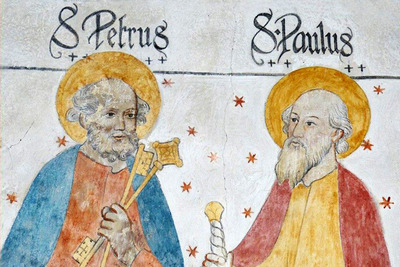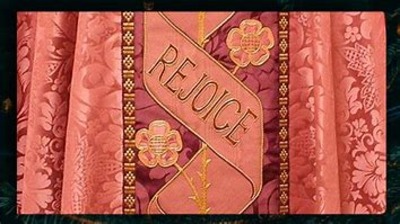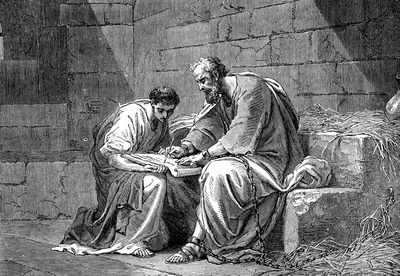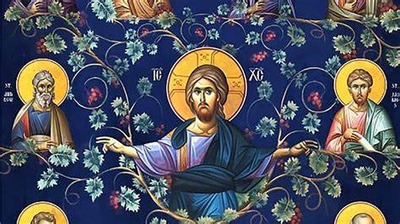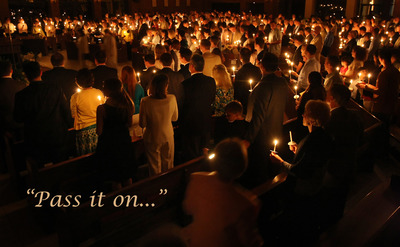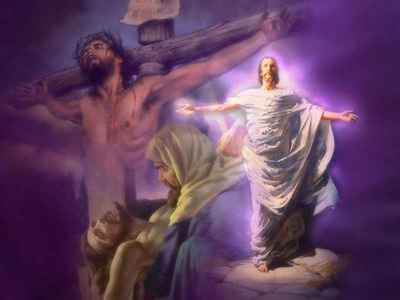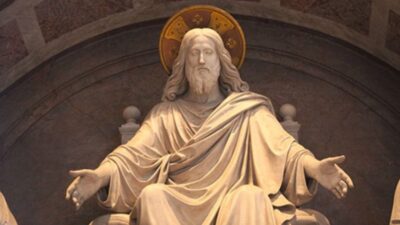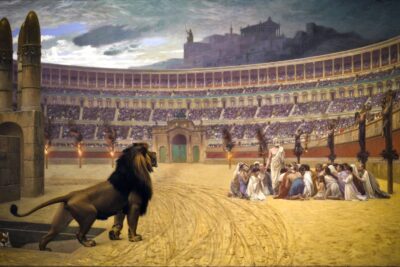June 29, 2025
|by N W
|
0 Comments
|
Commitment, Guest Celebrants, Perseverance, Saints, St. Paul, Vocations
Solemnity of Saints Peter and Paul, Apostles
June 29, 2025 — Year C
Readings: Acts 12:1-11 / Ps 34 / 2 Tm 4:6-8, 17-18 / Mt 16:13-19
by Rev. Sam Hill, Guest Celebrant
I am so thankful to be here again to celebrate Mass with you all. A couple of Wednesdays ago, on the 18th, I said that Holy Name of Mary embraced me and that I was kind of surprised when I decided to go to seminary and discovered that all these people really cared about the priesthood. You made me feel humble and I have so much gratitude to you all, especially as you took me in as a new convert and then as a man going off to the seminary.
What I was thinking about in reading this gospel today is that seminary is a time of deep interior conversion, or at least it should be. It’s a place where we find that we encounter the Lord day after day. We have Mass every day. We have confession available every day of the week if you need it, and we are encouraged to go at least once a week, as seminarians preparing to be priests.
In a way, Peter and Paul, I think, had a seminarian experience. They were with the Lord day after day, experiencing Him face to face, hearing His words, learning from Him, learning who they were themselves, and learning who Jesus was. Therefore, at the core of this process of conversion, which we are all called to as Christians, is that question that we hear today: “Who do you say that I am?” After encountering Jesus day after day, we find that we know him better and better, and we’re able to answer that question.
Who do you say that He is? Who is He to you? As we continue to grow in our Christian faith, Jesus never stops asking this question of us. That’s important because this question is a marker that tells us if we have grown. Have we grown closer to Jesus? Somebody asked if it is even possible to know God, though. Is it possible to know who Jesus is? In fact, Saint Augustine would say that the person who says that he understands God reveals to everyone else that he understands nothing. He doesn’t understand God at all.
Does this mean that we can’t know God? No, we can. We can know who God is, but our knowledge is maybe different than what we expect. Our knowledge of God is our relationship; it’s something that’s ongoing and dynamic. It’s continual and it continues to grow over time.
So, the answer to that question, “Who do you say that I am?” is not just one fixed thing. You can’t just say, “This is who Jesus is,” and that’s it and that’s that. But this question, this relationship, is dynamic; it grows. And it’s dynamic, not in the sense that it completely changes. Jesus is not changing it every day. God is the same from all time. But it changes in the sense that it’s always getting deeper. You’re always able to grow more deeply and more profoundly in your faith.
There’s no end to the knowledge of God, but the relationship can grow stale. In fact, it can lose life. We lose interest in Him when we stop seeking to know Him. The psalms describe Jesus as the fountain of life. He’s not just a pool of life. The baptismal font is not just a pool that’s stagnant or stale. It’s described as gushing water. We are always being filled continually with Him. In fact, that’s what heaven will be like. It won’t be this place where we just know who Jesus is. It will be where Jesus is revealed in His fullness day after day. There’s no end to God’s goodness, and heaven is the place where we will be filled day after day, moment after moment, with the fullness of God’s goodness.
A good friendship is one where you never stop learning more about the other person. I challenge each of you, and this is a difficult thing, to ask your friend if you think about it, “Who do you say that I am?” Have you ever been asked that by someone else? Who am I to you? How do you see me? How has your perspective changed about me over time?
I think it’s a very difficult question. A lot of our friendships can feel stale at some point. You have grown accustomed to each other, and you do the same things that you always do, but a true friendship is one that is always growing, always getting deeper, always getting closer. This could be a really cool way to take stock of a relationship that has grown stale in your lives.
“Who do you say I am?” This is a question that Jesus is asking us about Himself. He’s asking, who do you see Me as? This is a good Sunday for us to evaluate that question. Am I growing in love with God? Or have I let that relationship grow stale? Has that relationship grown flat?
Both Peter and Paul have great stories of growing in friendship with Jesus. Their stories are great, not because they are just great apostles. (We call them the princes of the apostles; they’re in the Collect prayer we heard this morning.) They’re the ones that founded the Church. Paul went out and preached to the Gentiles, and Peter became this solid figure who died in Rome. Their stories are great, not because of how they ended, but because of what happened in the meantime. They’re great because of the imperfections that they eventually overcame with Jesus’ help.
Peter was first a fisherman whom Jesus called and who came to know Jesus, but even in him we see this growth over time. He knows Jesus as this man who has called him to be His follower at first, and then in the gospel today, we hear that Peter makes this profound profession of Jesus, “You are the Lord.”
After this passage we will encounter a Peter who denies Jesus, a Peter who abandons Jesus on the cross. The fact that Peter is one of the apostles, allowed this story to be in the gospel. God allowed this story to be shared. He knows this story is for His glory and for our good. This story lets us know that even though we have come to know Jesus, we don’t have to be perfect. We can always grow more and more. Jesus allows that too. He knows that we’re imperfect, so despite that initial imperfection of Peter, despite his denial, despite his doubt, we come to the end of his life where he’s able to not turn away from his cross, but actually embrace it.
Saint Peter’s Basilica in Rome has become a place of pilgrimage, even from the time that he died. There’s a story about how, when Christianity became legal in Rome, the emperor Constantine built this beautiful church called St John Lateran, and that was going to be the heart of the church in Rome. In fact, it’s still the cathedral of Rome. It’s the place where the Pope presides.
However, Constantine noticed, and was disappointed, that many Christians would not go to that beautiful church. They kept going out of the city walls across the Tiber River to a grand mausoleum called Vatican on the Vatican Hill. He said, “Why are they going there?” It was because they had a devotion to Peter even in the early days. They had a devotion that carries on in the tradition even today. That place where Peter died, where he made that testament, where his denial became his acceptance, where his denial became his great act of love and sacrifice. It’s an important place for us as Christians and Catholics.
Paul similarly had a great conversion, because he was a Pharisee and he was persecuting the Christians. Today, if there were somebody who was murdering Christians and all of a sudden he said, “I want to become an apostle,” would we even allow that? Would we let that happen? It’s kind of crazy to think that the very man who was killing many, many Christians became the one to evangelize the entire world, and became a testament to the Gentiles. One of my favorite verses in the gospels says, “There is no greater love than this—to lay down one’s life for a friend.” That’s what the Christian life is about.
Who do we say Jesus is? He’s a friend, and that means that we grow in a relationship with Him day after day, that we grow deeper and deeper in love with Him each day. So where will this friendship with Jesus take us? I think we don’t really know. Peter was a fisherman. Paul was a Pharisee. Paul was killing Christians, yet these two men became great apostles. Each was unique, each was an individual in his mission, but they show us that friendship with Jesus is worth living for and worth dying for.
KEEP READING
 540-586-8988
540-586-8988 

